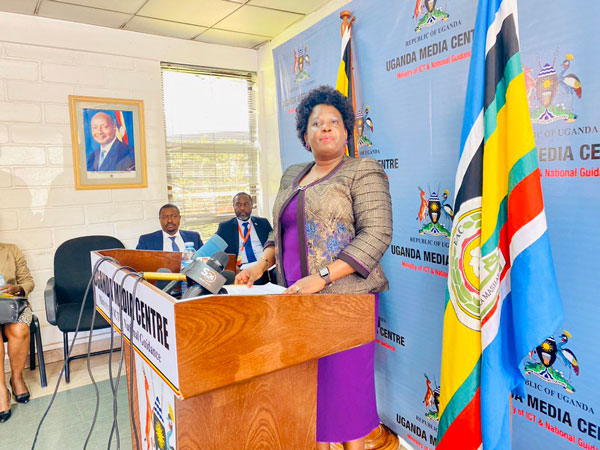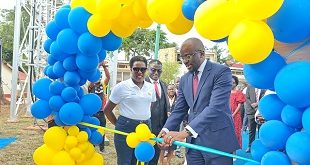
Kampala, Uganda | THE INDEPENDENT | The Auditor-General has observed what he described as unsatisfactory utilisation of the revolving fund under the Uganda Women Entrepreneurship Programme-UWEP following a value for money audit.
The Ministry of Gender, Labour and Social Development is implementing UWEP. It is an initiative of the Government aimed at empowering women to improve their income levels and contribution to economic development by improving their access to financial services and equipping them with skills for enterprise growth, value addition and marketing of their products and services.
In the past five years, the programme has disbursed Shillings 107 billion to 11,256 women groups benefitting over 135,000 women. These five years starting from the financial year 2015/2016 to the financial year 2019/2020 were the first phase of UWEP. Out of the 135,000 beneficiaries, 4,185 women have benefited from the Programme under the capacity and skills development component, which translates into 42 percent of the desired target of 10,000 women.
However, the Auditor General, John Muwanga, says that the programme is challenged by rationalization of funding, delayed funding of beneficiaries, limited focus on skills and capacity development, and inadequate coordination of partnering institutions.
“I undertook a Value for Money audit to assess the extent to which the Programme achieved its intended objectives. The programme through its revolving fund recovered over Shillings 16 billion from the loans disbursed to the women which funds were available for financing new women groups,” says the Auditor General.
Muwanga observes that there were delays in the disbursement of funds to the women groups and in some cases, the delays were more than 12 months from the time of approval of the applications to receipt of the funds, which affected the performance and success of enterprises specifically those in the agricultural sector that depends on the rainy seasons for planting. “These delays impact agricultural yields,” he said.
He also says that “I noted budget cuts for women groups at the Ministry of Gender level with some groups receiving less than budgeted funds to implement their enterprises; however, at the Local Government level, explanations for the budget revisions were not effectively communicated to the groups; which hindered implementation of activities of women groups.”
The audit further reveals that Shillings 16 billion remained idle on the recovery account in the Bank of Uganda over the five years. Muwanga says that only 6 percent of the funds, equivalent to Shillings 963 million had been re-disbursed, which denied the other qualifying groups access to funds.
Muwanga blames the Ministry of Gender through the UWEP Technical Support Unit for failure to plan effectively and coordinate the implementation of the activities to facilitate women groups to access markets for their products. The audit report notes that the intended objective of the funds disbursed may not be fully realized since also the access to appropriate technologies were not catered for in the project design and budgets for the entire 5-year period.
He also notes that there were underfunding for monitoring and supervision. “There was underfunding of monitoring and supervision activities at the Local Government level which affected the frequency of monitoring of beneficiary women groups. The programme gaps at the enterprise level could not be adequately identified and corrected on time,” the Auditor General adds.
At the National level, Muwanga reveals that the Technical Support Unit (TSU) undertook only 13 (43 percent) of the planned 30 monitoring and supervisory visits to the regions throughout the five year period, which resulted in the delayed identification of performance gaps and timely remedial actions.
The Auditor General recommends that the government prioritizes the capacity and skills development component of the Programme through increased sensitization to ensure that women groups receive the required skills to effectively implement selected enterprises.
He also says that the Ministry of Gender should consider reviewing the funding programme requirements to make training a prerequisite for all groups venturing into value addition enterprises for the first time.
“The programme implementation guidelines should be reviewed to reduce the time taken between approval and disbursement to improve timely access to funding to the groups. All budgetary cuts should be communicated to beneficiary women groups in time. The Ministry of Gender should ensure that the funds recovered are revolved in a timely manner to benefit the intended women groups, and ensure the sustainability of the Programme,” Muwanga recommends.
On a positive note, the Auditor General notes that UWEP exceeded its target in attracting 100,000 women beneficiaries over the five year period and managed to put in place implementation guidelines and training of beneficiaries and implementing partners.
He however says that, utilization of funds from the programme’ revolving fund and equipping beneficiaries with value addition and skills for enterprise growth was found to be unsatisfactory and merits urgent intervention. According to Muwanga, the overall prospects of the programme are promising if the challenges are addressed.
Last year, the government had proposed to move UWEP under the new wealth creation project Parish model from the Gender ministry to the Local government. However, Parliament shot down the proposal arguing that the program should remain under the Ministry of Gender for proper monitoring and implementation.
Matia Kasaija, the Minister of Finance, Planning and Economic Development told Parliament that the Fund would be retained under the Gender Ministry.
****
URN
 The Independent Uganda: You get the Truth we Pay the Price
The Independent Uganda: You get the Truth we Pay the Price



